Related Research Articles
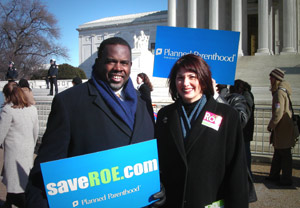
The United States abortion-rights movement is a sociopolitical movement in the United States supporting the view that a woman should have the legal right to an elective abortion, meaning the right to terminate her pregnancy, and is part of a broader global abortion-rights movement. The movement consists of a variety of organizations, with no single centralized decision-making body.
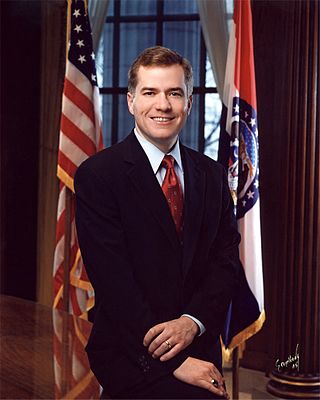
Matthew Roy Blunt is an American politician and former naval officer who served as the 54th governor of Missouri from 2005 to 2009. He previously served ten years in the United States Navy and as Missouri secretary of state.
The abortion–breast cancer hypothesis posits that having an induced abortion can increase the risk of getting breast cancer. This hypothesis is at odds with mainstream scientific opinion and is rejected by major medical professional organizations; despite this, it continues to be widely propagated as pseudoscience, typically in service of an anti-abortion agenda.
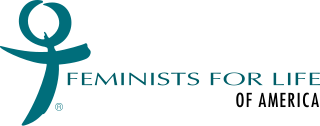
Feminists for Life of America (FFL) is a non-profit, anti-abortion feminist, non-governmental organization (NGO). Established in 1972, and now based in Alexandria, Virginia, the organization publishes a biannual magazine, The American Feminist, and aims to reach young women, college students in particular.
A culture of life describes a way of life based on the belief that human life begins at conception, and is sacred at all stages from conception through natural death. It opposes abortion, euthanasia, capital punishment, studies and medicines involving embryonic stem cells, and contraception, because they are seen as destroying life. It also promotes policies that "lift up the human spirit with compassion and love." The term originated in moral theology, especially that of the Catholic Church, and was popularly championed by Pope John Paul II; it has been widely used by religious leaders in evangelical Christianity as well. The philosophy of such a culture is a consistent life ethic.

Anti-abortion violence is violence committed against individuals and organizations that perform abortions or provide abortion counseling. Incidents of violence have included destruction of property, including vandalism; crimes against people, including kidnapping, stalking, assault, attempted murder, and murder; and crimes affecting both people and property, as well as arson and terrorism, such as bombings.
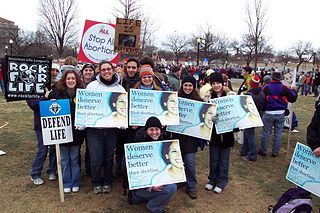
The United Statesanti-abortion movement is a movement in the United States that opposes induced abortion and advocates for the protection of fetal life. Advocates support legal prohibition or restriction on ethical, moral, or religious grounds, arguing that human life begins at conception and that the human zygote, embryo or fetus is a person and therefore has a right to life. The anti-abortion movement includes a variety of organizations, with no single centralized decision-making body. There are diverse arguments and rationales for the anti-abortion stance. Some allow for some permissible abortions, including therapeutic abortions, in exceptional circumstances such as incest, rape, severe fetal defects, or when the woman's health is at risk.

Missouri Constitutional Amendment 2 was a state constitutional amendment initiative that concerned stem cell research and human cloning. It allows any stem cell research and therapy in the U.S. state of Missouri that is legal under federal law, including somatic cell nuclear transfer to produce human embryos for stem cell production. It prohibits cloning or attempting to clone a human being, which is defined to mean "to implant in a uterus or attempt to implant in a uterus anything other than the product of fertilization of an egg of a human female by a sperm of a human male for the purpose of initiating a pregnancy that could result in the creation of a human fetus, or the birth of a human being". Commercials supporting and opposing the amendment aired during the 2006 World Series, in which the St. Louis Cardinals participated. The issue became especially intertwined with the 2006 U.S. Senate election in Missouri, with the Republican and Democratic candidates on opposite sides of the issue.
The following outline is provided as an overview of and topical guide to life extension:

Americans United for Life (AUL) is an American anti-abortion law firm and advocacy group based in Washington, D.C. Founded in 1971, the group opposes abortion, euthanasia, assisted suicide, embryonic stem cell research, and certain contraceptive methods. The organization has led campaigns and been involved in judicial actions to prevent the passage and implementation of legislation that permits abortion, or may increase prevalence of abortion, including successfully defending the Hyde Amendment in the U.S. Supreme Court.
The Republican Majority for Choice (RMC) was a Republican organization in the United States dedicated to preserving legal access to abortion. The group also supported federal funding for all kinds of stem cell research, including embryonic stem cell research.
Susan B. Anthony Pro-Life America is an American 501(c)(4) non-profit organization that seeks to reduce and ultimately end abortion in the US, by supporting anti-abortion politicians, primarily women, through its SBA Pro-Life America Candidate Fund political action committee.
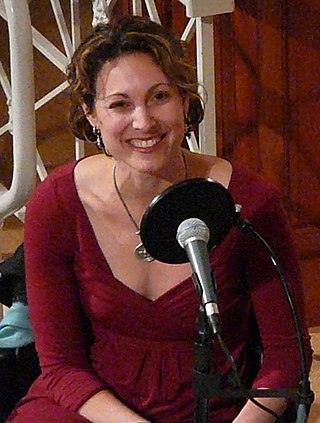
Emily Bazelon is an American journalist. She is a staff writer for The New York Times Magazine, a senior research fellow at Yale Law School, and co-host of the Slate podcast Political Gabfest. She is a former senior editor of Slate. Her work as a writer focuses on law, women, and family issues. She has written two national bestsellers published by Penguin Random House: Sticks and Stones: Defeating the Culture of Bullying and Rediscovering the Power of Character and Empathy (2013) and Charged: The New Movement to Transform American Prosecution and End Mass Incarceration (2019). Charged won the 2020 Los Angeles Times Book Prize in the Current Interest category, and the 2020 Silver Gavel Award from the American Bar Association. It was also the runner up for the J. Anthony Lukas Book Prize from Columbia University and the Nieman Foundation, and a finalist for the Helen Bernstein Book Award for Excellence in Journalism from the New York Public Library.

Christianity and abortion have a long and complex history. Condemnation of abortion by Christians goes back to the 1st century with texts such as the Didache, the Epistle of Barnabas, and the Apocalypse of Peter. In later years some Christian writers argued that abortion was acceptable under certain circumstances, such as when necessary to save the life of the mother, but these views did not become accepted teachings until some denominations changed their views in the 20th century. The Bible itself does not contain direct references to abortion.
Stem cell laws and policy in the United States have had a complicated legal and political history.

Georgia Right to Life (GRTL) is an American 501(c)(4) anti abortion organization that is non-profit, non-partisan, and non-sectarian. It was incorporated in 1971 by Jay and Cheryl Bowman. In 1973, it became the state affiliate of the Washington, D.C.-based National Right to Life Committee in response to the Supreme Court decision of Roe v. Wade which legalized abortion.
The Catholic Church and abortion in the United States deals with the views and activities of the Catholic Church in the United States in relation to the abortion debate. The Catholic Church opposes abortion and has campaigned against abortion in the United States, both saying that it is immoral and making statements and taking actions in opposition to its classification as legal.
Vincent Montgomery Rue is an American psychotherapist and advocate for government bans on abortion, as well as the founder and co-director of the now-inactive Institute for Pregnancy Loss. He says he has treated many women who have had painful abortion experiences, and who have wished that they had received more information before having their abortions.
National Institute of Family and Life Advocates v. Becerra, 585 U.S. 755 (2018), was a case before the Supreme Court of the United States addressing the constitutionality of California's FACT Act, which mandated that crisis pregnancy centers provide certain disclosures about state services. The law required that licensed centers post visible notices that other options for pregnancy, including abortion, are available from state-sponsored clinics. It also mandated that unlicensed centers post notice of their unlicensed status. The centers, typically run by Christian non-profit groups, challenged the act on the basis that it violated their free speech. After prior reviews in lower courts, the case was brought to the Supreme Court, asking "Whether the disclosures required by the California Reproductive FACT Act violate the protections set forth in the free speech clause of the First Amendment, applicable to the states through the Fourteenth Amendment."
References
- 1 2 Science in support of a cause: the new research, by Michael Kranish. Published in the Boston Globe on July 31, 2005; accessed November 27, 2007.
- 1 2 3 Is There a Post-Abortion Syndrome?, by Emily Bazelon. Published in the New York Times Magazine on January 21, 2007; accessed November 27, 2007.
- 1 2 Politicized Science: How Anti-Abortion Myths Feed the Christian Right Agenda, by Pam Chamberlain. Published in The Public Eye by Political Research Associates, Summer 2006. Accessed February 17, 2008.
- 1 2 3 Mooney, Chris. (October 1, 2004). "Research and Destroy" Archived April 4, 2008, at the Wayback Machine . Washington Monthly. Retrieved February 11, 2007.
- ↑ PBS NOW transcript, show #329, aired on PBS on July 20, 2007; accessed November 27, 2007. In the transcript, PBS senior correspondent Maria Hinojosa describes Reardon: "With a PhD from an unaccredited online institution, he's turned out dozens of studies that supposedly prove abortion is dangerous to women's mental health."
- ↑ David C. Reardon. Making Abortion Rare: A Healing Strategy for a Divided Nation (1996) Acorn Books. See especially Chapter Two Archived 2007-10-23 at the Wayback Machine where Reardon discusses the terms pro-life, pro-woman, anti-abortion, pro-choice and pro-abortion.
- 1 2 Reardon DC (2002). "A defense of the neglected rhetorical strategy (NRS)". Ethics Med. 18 (2): 23–32. PMID 14700036. Full text in pdf here
- ↑ Schmiege S, Russo NF (December 2005). "Depression and unwanted first pregnancy: longitudinal cohort study". BMJ. 331 (7528): 1303. doi:10.1136/bmj.38623.532384.55. PMC 1298850 . PMID 16257993.
- ↑ Elliot Institute Website Archived 2007-09-27 at the Wayback Machine Retrieved November 19, 2007
- ↑ Real Audio from the National Pro-Life Religious Council website Retrieved November 19, 2007
- ↑ "Pastors Gather to Meet Challenge of Pro-Life Ministry." Publication: National Right to Life News
- ↑ "Elliot Institute 2005 Year End Report". Archived from the original on 2008-05-09. Retrieved 2008-03-10.
- ↑ Elliot Institute Website "About Our Coalition"
- ↑ No Abortion-Breast Cancer Link, by Rita Rubin. Published in USA Today on February 26, 2003; accessed March 6, 2008.
- ↑ Elliot Institute Website "Politics"
- ↑ Elliot Institute homepage
- ↑ Missouri State Government website
- ↑ Court Shuts Down Anti-Stem-Cell Web Site for Copyright Violations, by Donna Higgins. From news.findlaw.com, originally published March 27, 2006. Accessed January 7, 2008.